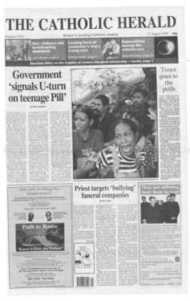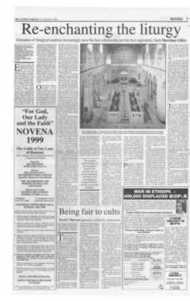Page 4, 27th August 1999
Page 4

Report an error
Noticed an error on this page?If you've noticed an error in this article please click here to report it.
Tags
Share
Related articles
‘it’s Bolshevism For The Home Counties’
Strangers In Our Own Land
Confusion Over Aids As A Heterosexual Disease
Road To Recovery
Suicide Also Harms Those Left Behind
The anti-conservative culture
Mary Kenny
MY FRIEND and colleague, Peter
Hitchens, is incandescent with vexation. He has received a very disparaging (and to my mind wholly unfair) review of his new book The Abolition of Britain — From Lady Chatterley to Tony Blair from Gerald Kaufman MP, writing in The Daily Telegraph. Mr Kaufman's sneering view is not a surprise, given the man's liberal-left-secularist attitudes. But The Daily Telegraph is. Peter imagined that the one newspaper which would understand his evocation of the conservative and Christian values that England once espoused should be The Daily Telegraph. He knows he will get a hostile review from The Guardian and The Independent. The liberal-left establishment always give him a hard time, though they always look after their own.
"You'll have to offer it up," I tell him. "Being a Christian means accepting that you will be hated and persecuted." "Then I'm not a very good Christian," he mutters. But actually, he is. The thing about Peter is, unlike many journalists, he really does practice what he preaches. He is a virtuous man.
His book, published this week by Quartet, is a series of knowledgeable and perceptive linked essays in the tradition of George Orwell, analysing the way that this country has changed since the death of Sir Winston Churchill in 1965. He became aware of the way the values had altered after he and his wife had spent five years abroad, in America and the Soviet Union, between 1990 and 1995. When they returned, it struck him that the essential British civility — the gentleness that Orwell spoke about — had gone. An element of barbarity had entered British life that had not been present before. This is the barbarity you see with boys and girls with rings through their noses and aggressive tattoos on their bodies. Much of this is the outcome of the "cultural revolution" that occurred in 1968, which was to fragment the whole web of accepted values, morality and decorum.
The undermining of the family has a great deal to do with this decline, in his analysis. The way that television has coarsened the social fabric is another. Pornography has won the cultural battles, and ideals which had gone back to St Paul and St Augustine, have been disparaged and dissolved. The BBC has become decadent, and the Church of England has allowed the rot within to crumble the institution. Education has sold the pass.
He doesn't think the English were traditionally a devout people — "not in the way that Roman Catholic countries might be". But Christianity was part of English common sense. And Biblical Christianity was fundamental to their consciousness, even as recently as the 1950s. William Tyndall believed that every ploughboy should know the Bible, and at one point every ploughboy did. Now many people cannot recite the Lord's Prayer.
Peter's chapter on the conspiracy behind the Pill is riveting. There was a fascinating chapter, too, on the triumphant march of gay rights, tracing the way in which Labour, in particular, has changed its tune over the homosexual question. Prominent Labour spokesmen swore blind, back in the 1960s, that they would never, ever agree to legalising homosexual relations for youths under 21. The chapter, which traced how this was artfully altered, was removed by the publishers because they were fearful of giving offence. Pity. It was frightfully well done.
Had Gerald Kaufman perused the missing chapter he would have been even more hostile.
Peter and his wife Eve have three children; two teenagers and a new baby son, who was born this year. The baby's arrival was a big surprise, and the couple were put under terrific pressure to have an amniocentesis, because they are well into their forties. But they said no, because they are against abortion; if the baby was handicapped they would accept that. This is very brave and good, and I admire it hugely. His articulate pro-life views have been put to the test, and it is an exacting test. It is frightening to contemplate the possibility of a severely disabled child — let us be truthful. And it takes a lot of courage and faith to stand up to medical experts in a position of authority, telling you what you "ought" to do.
Peter writes for the Express, as well as appearing frequently on TV and radio, and like the best conservatives he was a Marxist as a young man. Ex-Marxists understand that politics and culture are essentially about power, and the princes who wield it. But then St Paul understood that very well too.
P s I spend my week
ends near Dover in
P s I spend my week
ends near Dover in Kent, and the current controversy about the extra refugees and unofficial immigrants in the area is certainly viewed with alarm in the area. If we were true Christians, I sometimes reflect, we would not only welcome people into the country, but actually give them hospitality in our own homes. There was a recent episode where some weeping Chinese "boat people" were discovered, and, as I understand it, returned to the Continent summarily. It's sad. And yet, Dover — which has deteriorated greatly in recent decades, and is now a run-down, rather poor little town — will become a powder-keg of conflict if the numbers are excessive. No easy answers.
blog comments powered by Disqus











